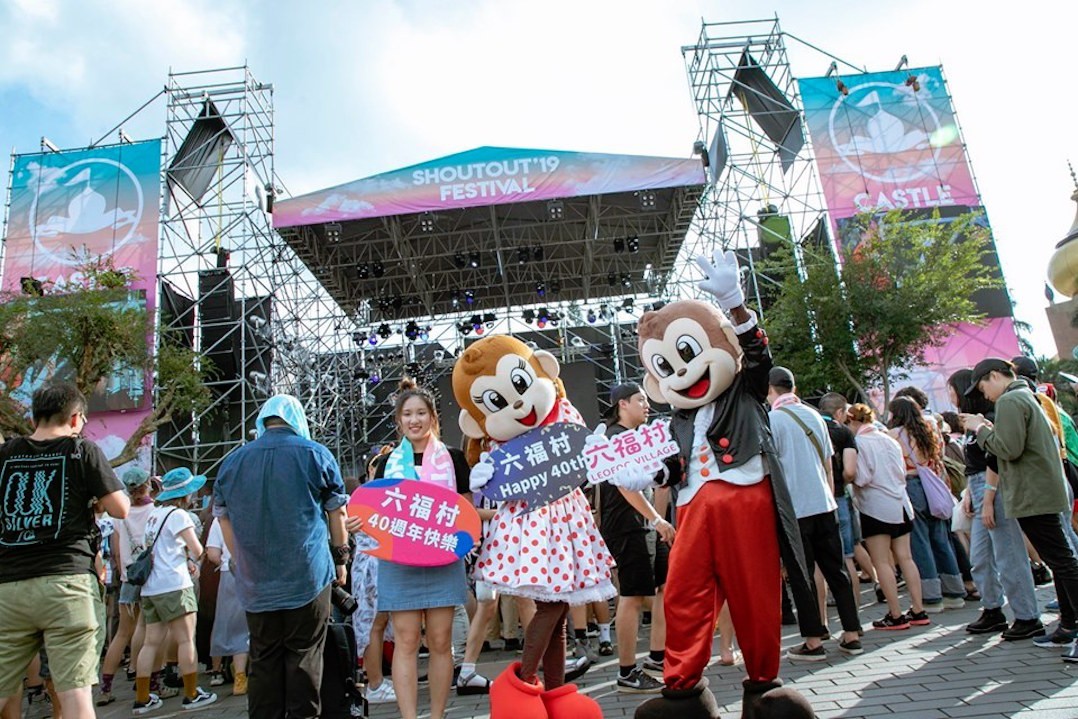So we were waiting for the 5350 bus to Leofoo Village Theme Park at eleven a.m. near the Zhongxiao Dunhua MRT station in Taipei. The electronic plaque that notified the arrival of buses showed that it had yet to depart. The bus sign told us it that we will have to wait ten to sixty minutes for a bus to arrive. I saw people giving up tickets online because they waited two hours for the bus, only to discover that she couldn't get on the bus because it was full, since passengers are not allowed to stand on buses that travel on highways. I was pessimistic.
Luckily, we were approached by woman who offered us a ride for 200 NTD each. Her operation is known as a "wild chicken car" (野雞車). We waited in her van as she collected more people who were headed to Leofoo Village. She grimaced as she told me "seems that this festival didn't do well on advertising. Not a lot of people yesterday."
"What a shame, they probably spent millions on those Japanese idol groups!" sighed Awen, who shot down my request to meet up at a later time because he didn't want to miss cutie♡mutie, the idol group that showed up on the festival website. "Must be Rock in Taichung, it is also happening." He let out a sigh.
The festival we were headed to was called Shout Out Festival (笑傲搖滾音樂祭). which is a clever transliteration of 笑傲 (pronounced Xiào ào), meaning "smiling proud." The two characters is taken from the title of the famous wuxia novel The Smiling, Proud Wanderer (笑傲江湖) penned by the almighty Chinese author Jin Yong (金庸) in the late 60s. Incidentally, one of the main attractions of the theme park is called 笑傲飛鷹 (literally meaning the smiling proud condor, but the official English name of the ride is the "Screaming Condor"), a U-shaped inverted rollercoaster imported from Switzerland. A seventeen-year-old girl died from it six years ago.
"Instead of trying to recreate the excitement of an amusement park in the music festival, why not bring the music festival directly to the amusement park?" was their slogan. It was perhaps not the first music festival to take place in an amusement park ever, Join Alive in Hokkaido, Japan has been doing it for nine years. However, it certainly was the first in Taiwan.
We waited as seven more people climbed into the van. Some of them were holding swimming gear, they didn't seem to be festival-goers. Awen whispered, "I wonder if they know that the theme park is booked by the festival? I think everyone who shows up at the door without a pre-sale ticket is going to have to buy the single-day festival ticket."
He pondered whether he should share this information with them. "But if we tell them and they decided not to go today, we'll have to wait here even longer. What's the price for a single-day festival ticket? 1400? I remember the usual entry fee is 800 NTD. So that's 600 NTD more. Okay la!"
So we drove southwest towards Guanxi Township, Hsinchu County. We arrived at the park at one p.m. and got our entrance bracelets. The stages were scattered amongst the five thematic areas of the amusement park. Two out fo the five stages were built next to rollercoaster rides; The Totem Stage was built in front of the park's free-falling ride, the Danu God, a drop tower seventeen stories high, far enough from us that we could see the giant baboon head on the top in plain view. Occasionally, a box would elevate up the tower and then drop with flailing legs sticking out, mixing in screams of horror and excitement with the band’s performance.
The Flying Stage was built in front of the Screaming Condor, a U-shaped inverted rollercoaster imported from Switzerland. Bands would perform while the ground underneath rumbled and we would see a rollercoaster burst out behind the stage for two seconds before it shrank back into the earth, too short for those who scrambled for their phones to capture its image. In terms of event-planning, having the music festival in an amusement park is a smart move, because there's already a built-in park route that allows its guests to arrive at different corners of the park with relative ease.
The park also has its own toilet facilities that comes with a well-planned theme park. In the case of Leofoo village, these toilets were not only accessible, but also large, clean, and air-conditioned,
a zone where you can hear parents disciplining their children because they were too tired to do so in the afternoon heat, and that now having now regained strength, they are ready to finish unfinished business. Say goodbye to the whole mobile toilet fiasco, with its long lines of people waiting, unpleasant surprises behind certain doors and (always) defunct flush functions.
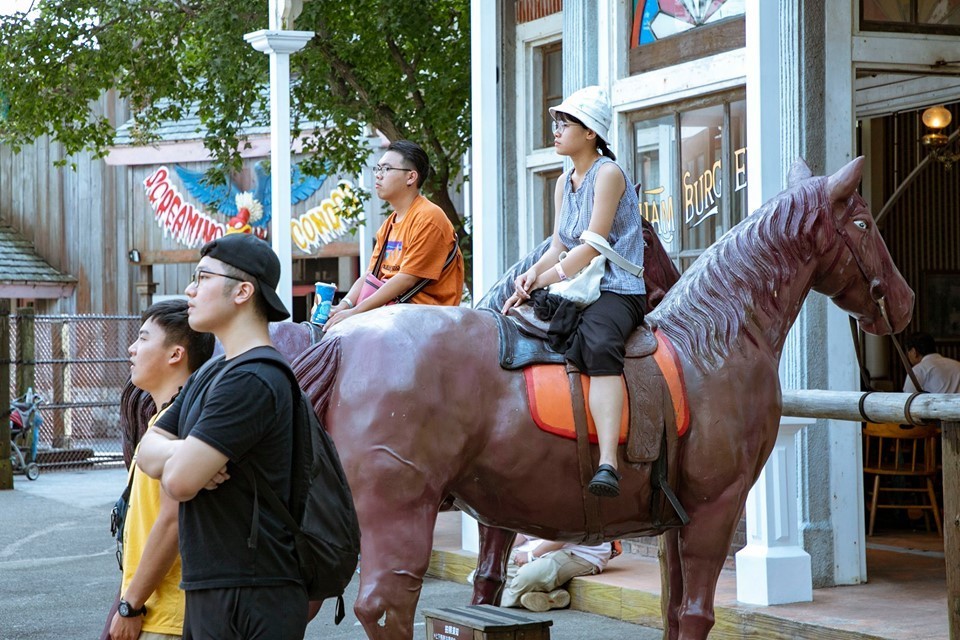
The combination of amusement park and music festival has a huge impact on how one typically moves about in the festival. Usually festival-goers have fixed agenda in mind as to which stages they want to be at at what time, because traveling from one stage to the other is regarded as labor, so the less time spent moving the better. In Shout Out, festival-goers could go on rides if they grew tired of listening to music, and that would not be pure labor, and while they waited in line for the rides, they also had the opportunity sample the music coming from other stages, increasing the chance for random encounters with bands which one may not have planned to listen to otherwise.
An hour later, I was on the Mighty Mountain Flume Adventure. 80's style Jurassic Dinosaur models, tiki columns and tall thatched huts. The canoes climb uphill then undergo two 90 degrees drop, first a three-stories drop, then a five-stories drop. While our canoes were slowly and steadily climbing up the hill, the sound of the Hormoneboys from the Totem Stage nearby came across us through trickling water and the sound of distant bombs made by canoes breaking the water surface. Crunchy ringing Telecaster, wistful chords, bass slapping, crying over lost youth, they sounded like an offspring of Touming Magazine. Boys singing about being tortured by desire *shudder*.
We rushed to the stage to meet the crowd swaying amongst the tiki huts that dotted the park's South Pacific section. The band ended their set with the song "Qīng Yǔ" (傾雨, pouring rain), which sounded like a good song to cry to after a breakup, quit befitting of the occasion too since we were all dripping wet from the ride and it was cloudy. The Danu God was visible behind the stage. It felt strange to suspend inside the baboon's upper jaw, with maniacal laughter coming from the small speakers inside, "why am I up here?" I thought to myself, puzzled. "Perhaps I will find out in a second."
As we came off the ride, we saw Empty ORio playing, a pop punk band formed by Fire EX.'s guitarist, and many people were dancing. Fire EX. is one of the most famous pop punk bands in Taiwan, and in 2014 their song "Island's Sunrise" was the face of the Sunflower Movement. However, currently the vocalist of Fire EX. is busy being a father, so their guitarist decided to start his own project. Though they are labeled as pop punk, it is worth noting that their melody borrows heavily from Hokkien songs written in the nineties by folk singers such as Hsieh Ming-Yu (謝銘祐) or rock singers like Lim Giong (林強), oftentimes the melody is wistful, weathered but warm like an old grandmother that has seen it all. Perhaps the affinity to this part of Taiwan's music history made these bands so accessible to the Taiwanese audience.
The crowd was really into the music, flinging their arms in the air. I never liked pop punk, but I was dancing too. There is something about testing survival fears at a music festival. It gives you some perspective on life and enables you to become less picky with the music.
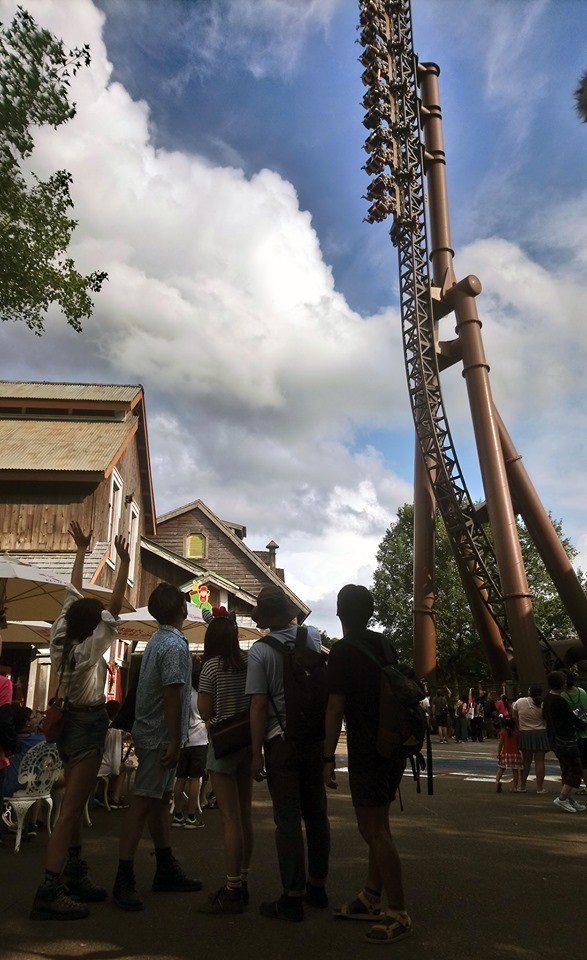
Another perk of holding the music festival in an amusement park, as mentioned to me by a friend, is that it provides the opportunity for close contact between artists and music fans. Rarely do you get to wait in line for the same ride with the members of your favorite band. It is a warm equalizer that dissolves the segregation of the stage.
The clash of wills between parent and kid was also a site to see. There was this screaming kid, I stood to observe him. The dad was holding his wriggling body. He who wanted to go somewhere but can't. He was saying "enough? 夠了沒?" to his son, until suddenly his voice turned into louder growl and the kid kinda froze. That's not something that you can see in ordinary music festivals. Personally I enjoyed the background soundtrack played in the Arabic section and South Pacific Section, but that's just because of my own preference.
An interesting phenomenon occurred when the theme park's built-in background soundtrack mixes in with the band's performance. I enjoyed how as the band's performance faded, the background soundtrack for the South Pacific section of the theme park reemerges, and persists while the band launches into another song. Usually the beginning of a song is not loud enough to cover up the theme park's soundtrack, so it's like listening to a two track mix, each following their own time, not being effected by the other, yet occasionally complimenting each other by accident. sometimes indigenous calls could be heard during a chorus. It might be interesting to make a DJ mix between the stage performances and the theme park section soundtracks.
The main stage was the Castle Stage that stood near the central ground fountain of the park, which was turned off to make space for the audience. Onstage, Hsinchu's very own ZiXuan & Slow Train were playing, light country music related to holidays and traveling. It suited the festival, with its visual design pastel blue and pink screaming family-friendliness. This family-friendliness seems to be a requirement of hosting the music festival, and aside from the Paradise Stage, which featured underground idol groups, most of the bands leaned towards indie-rock, nothing too dark or heavy. The overall "cleaness" of the festival also reflected on the festival-goer's spirit. No one was improperly wasted, if people were enjoying themselves, it was because of their common appreciation for the music, nothing else. If the crowd suddenly split into half, it was because a baby stroller was charging through, not because someone was too wasted that they needed medical attention.
The vocalist played the guitar and harmonica and sang in Hakka and Hokkien, the two native languages of the Han Chinese ethnic group in Taiwan, which has been enjoying a renaissance in Taiwan's rock music up till now after the democratization and the lifting of the martial law. Evidently, two successive waves of national language movements were not enough to stamp out the native Han languages . I cannot say the same about Indigenous languages.
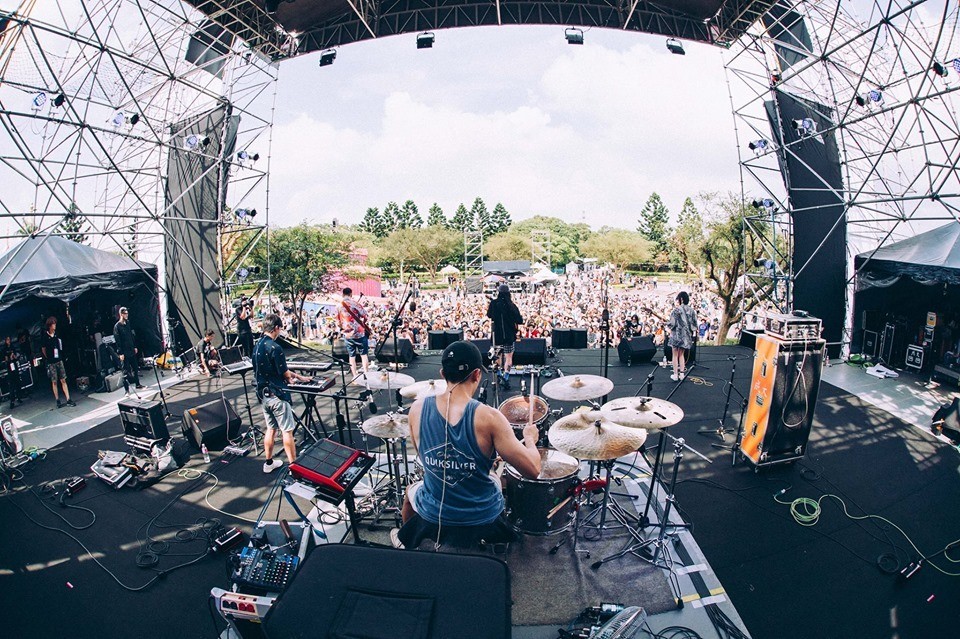
ZiXuan & Slow Train in particular seemed to be deeply involved with Hakka culture. They launched an experimental tour last year that took place in ten Hakka villages in Taiwan, local tour guides introduced Hakka culture to the audience. Their tour was featured on the Hakka TV news channel. A brilliant idea indeed.
Wondering towards the Wild West section, we bumped into the Doodle bassist Guo-hung, who was in a wheel chair, having slipped on the liquid from his own smoke machine yesterday night. I knew him because he lended us his smoke machine for No Taste Club, an event hosted by me and Betty Apple and the Singaporean collective Horizon99 at DJ Jerry and Luo-ma's taike nightclub, The Box. He was there the whole time controlling how much smoke there should be in the room. Next to him was Lin Chao-yu from the 8-bit core band P.C.B. (short for Physical Chemical Brothers), who was hired by Doodle to work his laser. Lin also did laser art for No Taste Club.
Delighted to meet familiar faces, Awen began to recount his favorite Leofoo Village story: "one time me and my buddy rode the Danu God twelve times straight. You see, we were focused on getting the perfect rollercoaster photo. It turned out to be a work of art and the clerk manning the photo booth asked us if he could make a cardboard cutout out of it."
At one forty-five p.m. we travelled towards the water park to see the Fairy Stage, located outside the theme park. At the waterpark, people were either being ejected out of waterslides or were floating in their swimming rings. "I saw those Japanese girls pass by earlier! They were really cute and smelled really good, just as advertised!" Awen leered. He was anxious to catch their performance, so we got there thirty minutes before they were scheduled to play, just in time to enjoy the last few songs performed by Lunch Girls.
The stage was built on a sandpit. Nine girls in sailor moon outfits were bouncing around onstage, busy with their choreography, singing in Japanese. They used a high-pitched anime vocal technique that requires a lot of pressure on the stomach and mental focus on the nose.
"So fat!" Awen grimaced. "They do not look like the same people on the music video, and these speakers sound terrible," he complained, who by the way was not wrong about the sound quality at the Fairy Stage. Nevertheless, a small but loyal male fanbase remained stationed beneath the stage. Clutching their long towels printed with Shout Out Festival logos, they flung their arms towards the girls on every accented beat, their towels shot towards them then dropped.
In between songs, the girls spoke to the audience in mandarin Chinese, which surprised us, because it was good mandarin Chinese, not the half-assed attempts that you get when Japanese idols greet their Taiwanese audience. It wasn't until later that we found out that these girls were local Taiwanese underground idol groups, not imported from Japan. Underground idol groups are made up of girls who find themselves unsupported by big agencies but want to try a shot at becoming an idol star nevertheless.
There is a documentary on the internet about how idol groups in Japan live way below the poverty line and grow bean sprouts on the windowsill to save money on food. I hope Lunch Girls lead a better life than that. Most of the songs they sang were Japanese anime covers, or songs by other Japanese idol groups. On their youtube channel, under the video titled "What Have We Been Doing These Last Four Years," you will see clip after clip of choreographed dances held at manga-related events or cosplay competitions. They recently performed at The Wall along with ACG cover bands from Malaysia and Taiwan, as well as idols from Japan. Evidently, the influence of anime is world-wide.
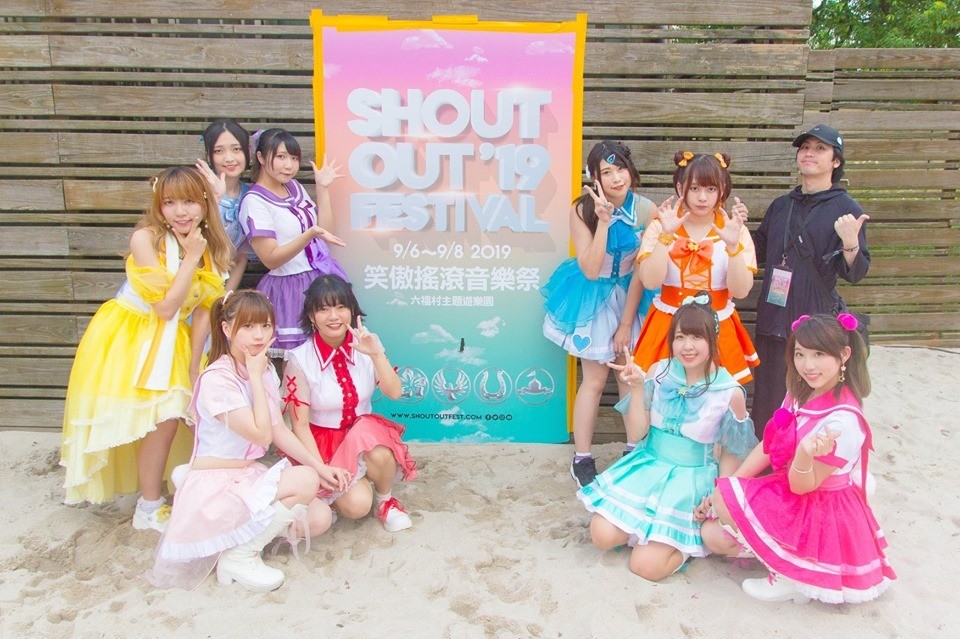
However, it was clear that Lunch Girls wanted to be more than just anime cover singers. "Let's give it up for our very first original mandarin single!" announced the girl in the orange sailor moon suit, "but first, are you ready to get wet?" The girls picked up the water guns that were lying at the back. I could sense the photographers tensing up. After a round of spraying, the girls delivered a number called "Grilled Meat Magic," which combined separate motifs such as hunger, the anticipation of adventure, chasing dreams, gratitude, and eating grilled meat.
With the ending of Lunch Girls, I heard the sound of the band Amazing Show coming from the Castle Stage. "Last time I visited this place was seven years ago, in high school," spoke the lead vocalist Gobo (狗柏) spoke in his idiosyncratic raspy voice. The amusement park has been around since 1979, and exists in the common memories of all Taiwanese, it being the most-visited destinations for school trips. The festival became a chance for adult music fans to revisit their childhood, and recounting one's childhood or teenage memories at Leofoo Village was popular among vocalists who had to talk to their audiences during song intervals. There was a huge crowd, they spread across the central fountain a sea of (mostly) dark heads, a giant Arabic Castle was visible above the dark sea, which belonged to the theme park's Arabian Kingdon section.
I first got to know Amazing Show from the song "King of Light," where the hokkien lyrics speaks about young customers being ripped off at electronic stores. They are the kind of band that got famous from their music videos on the internet before they actually begun to perform. In the music video, Gobo is seen wearing red riding a red motorbike and carrying a barber's neon pole modified to look like a flamethrower on his back. The neon-pole-flame-thrower was in fact a DIY instrument that was controlled by the light emanating from the rotating barber pole, which he made himself.
In 2018, the band put out a documentary about the making of their noise instrument/deluxe album, also titled King of Light, which later won BEST SWAG at America's 17th Independent Music Awards. Aside from your usual CD, the deluxe album also contained a DIY synthesizer with a built-in speaker that could be controlled with light sensors, knobs, and buttons. The idea was to have a release event with all the audience holding up their synths while the light from Gobo's neon-pole-flame-thrower synced with the venue's stage light, thus controlling the audience's synth as well. They got the capital through crowdfunding (amassing 1,264,100 NTD) and hosted workshops to assemble the instrument. For many fans, it was their first time soldering, and some of them had since self-released self-made tutorials on how to tinker with the deluxe album synth.
Though the DIY synth is a big attraction for Amazing Show, in their actual music the instrument is only featured in snippets. They are a rock and roll band, after all, not a noise band. They played mostly disco, folk or rock, a bit like a conglomeration of Mayday and Wubai, with occasionally Jay Chou-like rapping. The keyboard also had that saw wave quality that often appeared in taike music. Harking from Chiayi of South Taiwan, they are able to don the taike label without being posers.
Mid-set, I traveled back to the Water Park hoping to catch cutie♡mutie, but found out that they had already finished, since these idol group sets are usually shorter. Heading back to the Castle Stage which was near the entrance, I waited impatiently to get my bags checked, again. When I finally got to the Castle stage, Amazing Show had already finished, so I met up with Awen again at the theme park zoo at three pm. He said there was a monkey zoo calledㄅㄆㄇ in Xinchu that was wiped out by a typhoon two decades ago, and all the remaining monkeys got sent to Leofu Village. We stared at the tiger that draped itself against the mote. Awen cooed at the meerkats. We snickered at the parents bringing their kids, they probably didn't know today was a festival and were forced to pay 600 NTD more at the door. I expressed how I regretted that I missed cutie♡mutie, which was next in line after Lunch Girls, but Awen said I didn't miss much. "They were all lip-syncing, Lunch Girls had more self-respect."
